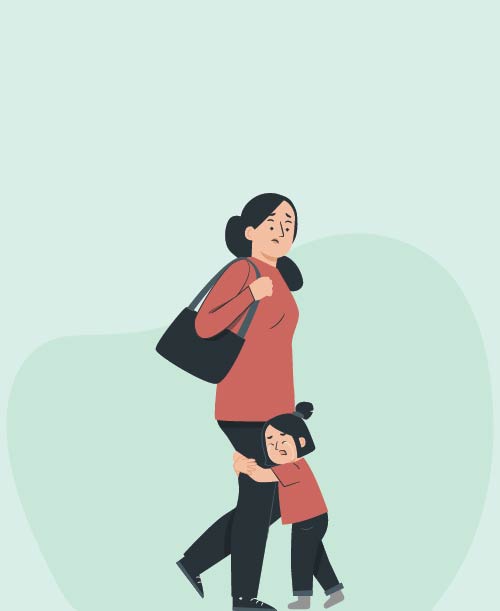

A Complete Guide on Separation Anxiety in Children
If a parent has to leave their child for a longer period of time because of any unavoidable circumstances, it can cause the child to experience separation anxiety. This can overwhelm toddlers, who may start behaving strangely or even become clingier when left alone. In this article, we will discuss separation anxiety in vivid detail.
What Is Separation Anxiety?
Separation Anxiety is a condition in which a child becomes extremely anxious when separated from parents or even at imagined separation from parents. It is a normal stage of development for infants and toddlers and while young children often experience a period of separation anxiety, most children outgrow separation anxiety by about 3 years of age.
In some children, separation anxiety is a sign of a more serious condition and it may seem more intense or prolonged, and even interfere in a child’s daily activities. This is known as separation anxiety disorder (SAD), starting as early as preschool age.
Less often, SAD can also occur in teenagers and adults, causing significant problems leaving home or going to work. But treatment can help.
Symptoms of Separation Anxiety
Most common symptoms of separation anxiety disorder are:
• Recurrent and excessive distress about anticipating or being away from home or loved ones
• Refusing to be away from home because of fear of separation
• Constant worry about losing a parent or loved one to an illness or a disaster
• Endless worry of separation from parents or loved ones
• Not wanting to stay alone at home, without a parent or loved one in the house
• Reluctant or refusing to sleep away from home without a parent or loved one sitting nearby
• Repeated nightmares about separation
• Frequent complaints of headaches, stomachaches or other symptoms on anticipation of separation from a parent or loved one
Treatment
Most mild cases of separation anxiety disorder don’t need medical treatment. In more severe cases, or when the child refuses to go to school, treatment may be needed. Treatment includes:
1. Cognitive Behavioural Therapy:
This is the main form of treatment and the focus is to help the child handle being separated from their parent or loved one
2. Medications:
Antidepressants or other anti-anxiety medications may be used to treat severe cases
3. School interventions:
Mental health practitioners at the child’s school can offer therapy to help them manage SAD symptoms.
How Can I Help Support My Child?
Leaving your child for a short period of time is an important part of their emotional and social development. If the child is showing signs of separation anxiety disorders, then follow the below methods in order to help them:
1. Practice short separations with child and work towards longer ones
2. Leave their favourite soft toy or blanket to help ease separations
3. Discuss plans for your return helps to ease this fear
4. Introduce a new baby-sitter or caregiver gradually by arranging some short get-togethers and by making your child feel comfortable before leaving him/her alone with them
5. Saying goodbye to your child is never easy but one must ensure to make it quick. Try your best to remain calm and positive while saying goodbye and let them know you will be back soon
Conclusion:
As a parent, it's natural for you to spend more time with your child but you should prepare your child for separation as early as possible in order to minimize the risk of them experiencing separation anxiety disorders. So, make sure to recognize, realize and work on this matter to develop a healthy future for your child.
Sources: UNICEF, Healthy Children, Help Guide
Disclaimer: This blog provides general information and discussions about health and related subjects. The information and other content provided in this blog, website or in any linked materials are not intended and should not be considered, or used as a substitute for, medical advice, diagnosis or treatment. Kindly contact your Doctor before starting a new medicine or health regime.
Related Articles
Anxiety In Children – What You Need To Know
How Social Media Affects Your Mental Health And Leads To Anxiety
Eco Anxiety – Understanding The Problem And Dealing With It
Meditation - A Drug Free Solution For Anxiety
Published on October 11, 2022

















 Health Insurance
Health Insurance  Travel Insurance
Travel Insurance  Car Insurance
Car Insurance  Cyber Insurance
Cyber Insurance  Critical Illness Insurance
Critical Illness Insurance
 Pet Insurance
Pet Insurance
 Bike/Two Wheeler Insurance
Bike/Two Wheeler Insurance  Home Insurance
Home Insurance  Third Party Vehicle Ins.
Third Party Vehicle Ins.  Tractor Insurance
Tractor Insurance  Goods Carrying Vehicle Ins.
Goods Carrying Vehicle Ins.  Passenger Carrying Vehicle Ins.
Passenger Carrying Vehicle Ins.  Compulsory Personal Accident Insurance
Compulsory Personal Accident Insurance  Travel Insurance
Travel Insurance  Rural
Rural